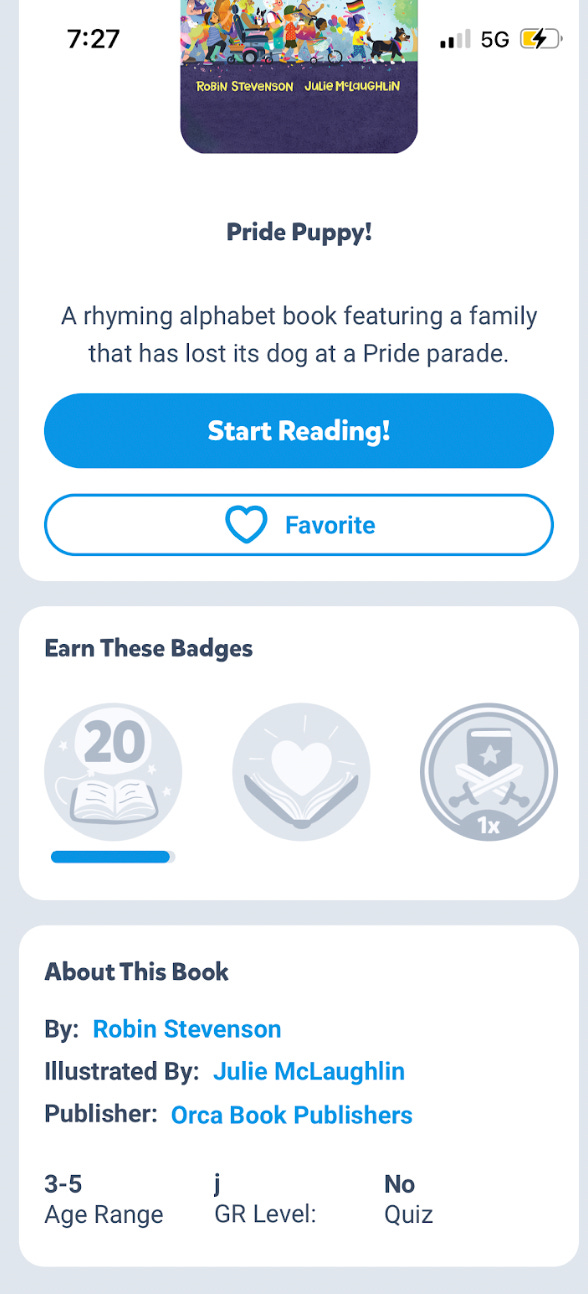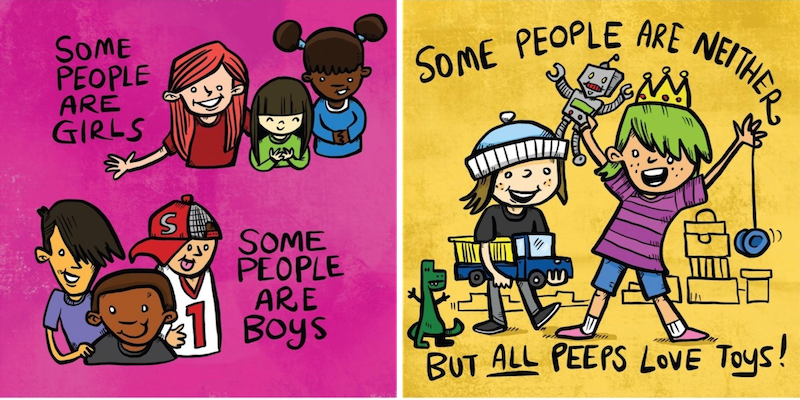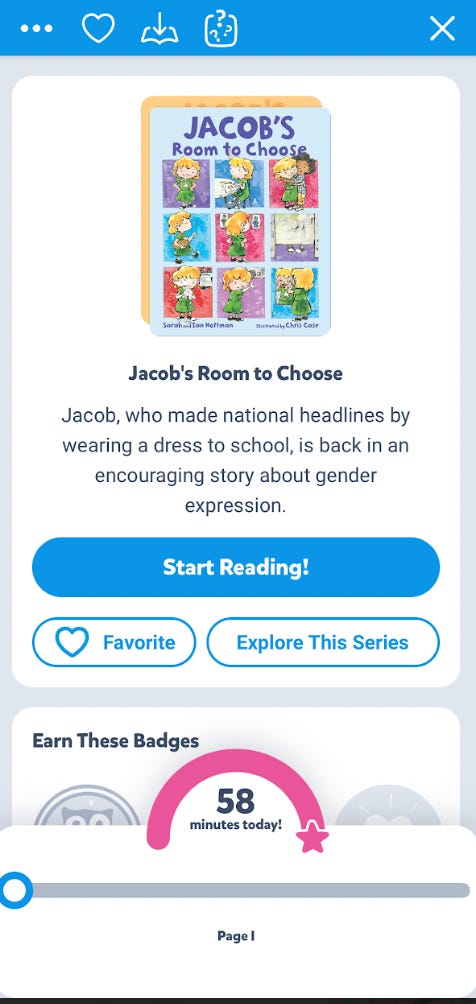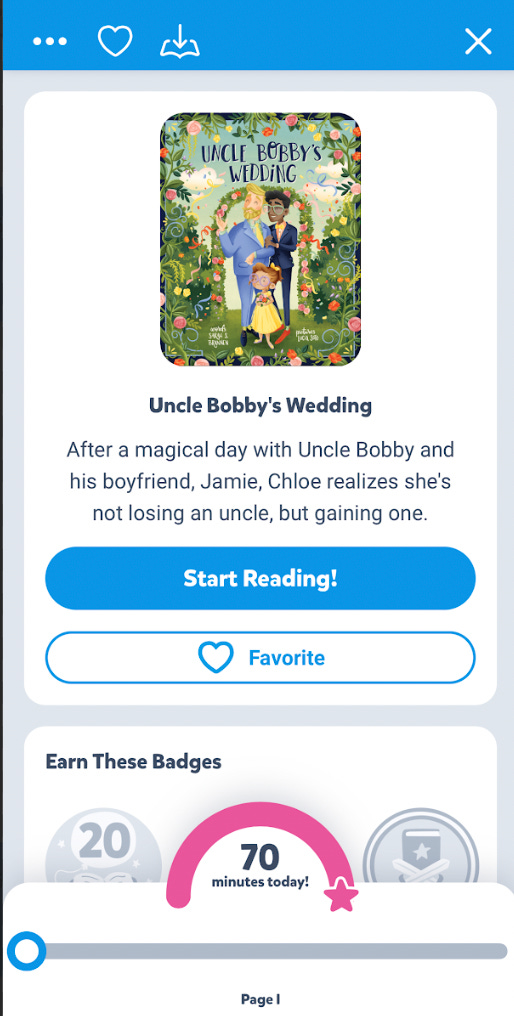
Parents raise 'epic' book problem in Catholic schools
Parents say a widely used digital library, Epic Books, brings objectionable books into Catholic classrooms. How will dioceses respond?
When the Covid-19 pandemic shuttered schools across the U.S., Catholic schools aimed to adapt quickly — shifting to Zoom classes, equipping teachers for web-based instruction, and in some places even launching virtual schools.
While students have long returned to their classrooms, the pandemic’s impact on Catholic education is still being unpacked. And among other effects, pandemic-related closures accelerated the integration of new technologies and online instruction into Catholic classrooms.
But a shift to more online instruction has also meant an uptick in the use of third-party apps and online programs used by Catholic schools students.
Amid that rise, some parents and administrators are warning that an online digital library called Epic Books gives Catholic school children access to books that promote “gender ideology” and aim to “normalize” LGBT relationships.
Some Catholic school parents have encouraged vigilance about the third-party apps used in Catholic schools, while the director of the USCCB’s education office told The Pillar that the texts and literature in Catholic schools should focus on forming students for Christian discipleship, with a focus on “what is true, good, and beautiful.”
As parents raise concerns, Catholic schools and dioceses are left to decide how best to address controversial content embedded in the apps that some classrooms have come to rely on.
Rachel Ullmann, a Catholic school parent in the Archdiocese of Baltimore, heard her second-grade daughter talk this March about using the Epic Books digital library on tablets in her classroom at St. Stephen’s School in Kingsville, Maryland.
Ullmann said she and her husband were concerned — they’d not heard of Epic Books, and they weren’t sure what kind of books were available through the program.
She said that when she checked classroom emails from earlier in the year, a teacher had once mentioned using Epic Books, but Ullmann hadn’t really given it much thought.
But in March, Ullmann and her husband decided they wanted to know what their daughter was reading.
At first, they didn’t know how to access Epic’s library.
“I emailed the teacher, I asked for access to Epic. I even spelled it wrong the first time. I didn’t quite know what it was,” Ullmann told The Pillar.
“But she didn’t give me access to the product. Instead, she said I could pay for a subscription. And I thought that was odd…. But I downloaded the app and got a free trial so I could check it out.”
Ullmann said she was discouraged by what she found. She told The Pillar that the Epic digital library — curated through licensing agreements with publishers — included dozens of books about homosexuality and transgenderism, which she found inconsistent with Catholic doctrine on the subject. And because some of those books were labeled at early grade reading levels, they could be accessed by young school-age children, Ullmann said.

Ullmann notified school administrators about her concerns regarding Epic, and the app was put “on hiatus” at St. Stephen’s School. But Ullmann said she wanted to see a report of what her child had read on the app, and to know that the Archdiocese of Baltimore would take seriously her concerns.

Ullmann hoped that other schools in the archdiocese would turn off Epic, and that parents would be given a chance to know what their children had been reading.
On March 24, a letter sent to St. Stephen’s families explained that Epic Books, “which had been used for a number of years at St. Stephen and across the archdiocese,” had “beg[u]n adding content that is not in alignment with the teachings of the Catholic Church.”

The school’s principal explained that “there is no way to adequately filter the content on Epic! without exerting extensive time and energy,” adding that “Epic! will not be used the remainder of this school year and we will await information from the Archdiocese for the 23/24 school year.”
The letter also offered to make available to parents data from their own students’ Epic reading logs, so that they could better understand what their children had been reading.
But while the school addressed concerns about Epic Books, Ullmann said she had a difficult time getting a hearing from archdiocesan officials — and that education officials didn’t seem to understand or empathize with her distress about the material available to her children.
Ullmann said archdiocesan officials in Baltimore told her that the schools in the diocese have autonomy to choose books and select technological resources. When she pushed concerns about Epic Books, conversations broke down, and she was eventually encouraged to withdraw her children from Catholic schools.
She said she initially had a “productive conversation” with the archdiocesan superintendent, but got pushback from administrators after she called faculty members to talk with them about Epic Books.
Ullmann said she had called faculty members because she wanted to verify that school officials were addressing her concerns about the app. She said she was distressed that her daughter might have been exposed to books she would not approve, which would conflict with a Catholic worldview, or might call into question the teachings of the Catholic faith.
“I felt I needed to know that they had been informed … We were just completely distraught. So that was my intention in calling those individuals. Because my children’s innocence is too important, and I needed to ensure that they could safely return to school.”
“We did withdraw the kids from the school,” Ullmann told The Pillar, “we felt we had no other choice after being called impatient, aggressive, and [told] to find another school.”
Soon after her children withdrew from school, Ullmann said, she was given her daughter’s reading logs.
She learned that in first grade, her daughter had read on the Epic Books app several books that gave her concern, including “Maiden and Princess” which, according to promotional materials, aims to “accelerate LGBTQ inclusivity and acceptance,” and “Princess, Princess Ever After,” which has been celebrated as a groundbreaking “queer graphic novel.”
Ullmann said she believes parents need to be vigilant about the material available to their children, even if school officials do not seem initially receptive to their concerns.
For its part, a spokesman told The Pillar that the Archdiocese of Baltimore is working to evaluate the place of the Epic Books library across its schools.
“The Department of Catholic Schools has directly responded to the concerns raised by parents,” an archdiocesan spokesman told The Pillar.
“In addition, the leadership has taken the initiative to conduct a comprehensive review of all curriculum materials, which includes the EPIC! reading and learning platform,” the spokesman said.
“At one specific school, EPIC has been paused for further evaluation, and in all other schools, administrators have been reminded that they are required to review materials before making them accessible,” the archdiocese added.

While Ullmann says school administrators told her the problematic books were a recent addition, she is not the first to raise concerns about Epic Books in the Archdiocese of Baltimore.
When schools closed for Covid in the Baltimore archdiocese in March 2020, Lauren Blair was glad that her kindergarten son had come home with work to do, and things to keep his education on track even outside of the classroom.
But she was surprised when she heard her son listening to an illustrated book on a tablet, part of the Epic Books digital library made available to his class.
“Part of his assignment was to read on Epic,” Blair recalled. “And thankfully, we had selected the read-out-loud option, as opposed to him putting on earphones, so I could hear it.”
Blair said she overheard her son listening to a book which included gratuitous mentions of undergarments, and seemed to raise questions about gender identity that were not appropriate for a five-year-old in a Catholic school, she said.
Blair told The Pillar that she contacted her son’s teacher, and, “she said back that ‘Epic is an awesome resource that we are lucky to be able to use both at home and in class.’”
“The teacher said that she approved all of the books they read on the app — so she basically owned that she had assigned this book,” Blair said.
Blair said she told her parish pastor about the book, and about the teacher’s reaction.
“And he was really upset about that, but … I don’t know what he did about it. But he had just gotten to the parish, and he said he recognized there were a lot of catechetical issues at our school, that started with the teachers. And he said the book was disturbing to him, but he couldn’t put out all the fires at once.”
“My pastor was absolutely not ok with it, but I’m not sure what happened, because then after that, we moved, so we weren’t at the school anymore.”
But Blair said she believes the Baltimore archdiocese should have taken her experience as an opportunity to prohibit the Epic Books app in its schools.
Blair told The Pillar she thinks the archdiocese should better monitor the curricular materials in individual schools, especially if teachers are not equipped to judge whether material aligns with Catholic doctrine.
“The teacher really defended Epic, like, that this was an ‘awesome resource that we are blessed to use.’ I’m sorry, but I don’t consider it an awesome resource.”
“Here’s my question to the archdiocese: Are they ok with this? Because I’m not ok with it. Because if part of their assignment is to read from Epic, then we are trusting that you have leafed through the materials that you are telling them to read. So if the archdiocese has not leafed through the materials themselves, then they should not be assigned to any of our children.”
“So I would ask to completely remove it. If they can’t — I mean, are they ok that this has probably happened multiple times? If a five-year-old boy can stumble onto a story that’s completely inappropriate, they should have a problem with it and remove it.”
Blair said she understands that a school might sometimes miss problematic material introduced to students. But she said she hopes that Catholic schools will make good use of parental input as they add digital curricula — and see parents as valuable partners in assuring the Catholicity of a school.
“In addition to ABCs, I’m assuming that they want to teach Christ. And I assume that a parochial school is a branch of the mission of the Catholic Church, and that they are looking for opportunities to catechize and evangelize.”
“And it really seemed to me that that was not a priority — that it was almost my problem to have to sift through the material they were giving me, because it wasn’t just a priority for them.”
“Instead, I was made to feel like I was the only one who had an issue with it. “It was like, ‘Epic’s an awesome resource, and you’re the one that needs to adjust — like, get on board.’”

Epic Books was launched in 2014, as a subscription-based reading service for kids. The company, launched by Silicon Valley and media executives, says it is the leading digital reading platform, with more than 40,000 titles available to classrooms and subscribers.
The company was purchased in 2021 by Indian education technology company Byju’s for some $500 million.
While the company offers a home subscription for family use, teachers are able to make free use of the app for students during school hours, and are able to both assign books and monitor how students in their classrooms use the app.
The company says that more than 1 million teachers have signed up to use the program in their classrooms, and The Pillar has found the app used in at least a dozen U.S. dioceses.
Teachers in one Florida public school district are no longer permitted to use Epic, because of a 2022 state law requiring school district officials to review library books made available to students in the state.
The Brevard Public School district decided last year that it could no longer continue using Epic, because new titles are so frequently added to the app that monitoring would be difficult.
Epic told The Pillar that the company “provides parents and teachers the ability to filter content based on their child’s learning needs and reading preferences. We offer filtering options to every Epic subscriber and teacher.”
But while parents have the ability to filter content if they purchase a family subscription, the feature is limited to teachers when Epic is used in a classroom.
The company clarified that it does not contract with schools or school systems, but with individual teachers only, leaving district or diocesan officials unable to filter books deemed inappropriate.
Because of that feature, Catholic school districts can either prohibit use of the app entirely, or expect individual teachers to make decisions about filtering the titles available through the app, with no override options.
Erick Rubalcava is chief of mission and Catholic identity for the Catholic schools of the Archdiocese of Los Angeles.
Rubalcava told The Pillar he’d learned about Epic recently, after it was brought to his attention by a teacher in a Los Angeles Catholic school.
Rubalcava said his office is still considering how it will address the use of Epic in Catholic schools in the archdiocese, but he offered the perspective of a former school administrator on the use of the app.
“As a school administrator, with faith being the central aspect of why we exist as a Catholic school, I’ve got to be really critical of what we’re allowing in the school community for kids and families to be exposed to without the proper formation of Christian anthropology.”
“That’s how I would look at it — we have to be vigilant in our roles now as administrators. We have to know how to respond and be vigilant to cultural issues that are happening, in looking at all things with a critical eye, not just apps but all things in our schools, because essentially it’s the souls of these kids that’s affected, and the souls of parents that might not have the formation to know better.
Rubalcava said that a rise in the use of digital technology in schools calls for more vigilance.
“Covid set up a new standard of how a school responds to learning. Learning is changing. And how we teach is changing. It’s constantly moving. And so while vigilance is always needed, even before the rise of the technological age, because of the ability of technology to put information into the hands of young people who may have no sense of how to interpret its context through the eyes of faith, I think it’s even more critical now.”
“That’s absolutely accelerated by Covid,” he said.
Rubalcava said that technological changes present new challenges in education. But he said school leaders need to approach those challenges from a pastoral perspective, rooted in their own lives of faith.
When he was a school principal, “I saw my role as trying to shepherd a community through the challenges it faces. Any leader in a Catholic community has to assume a pastoral mindset, a shepherding mindset in our roles.”
That role means more than being “academic instructional leaders,” he said. “That’s essential and critical, but also now, very much, to be ready to shepherd a community through these new challenges we’re facing.”
Mary Pat Donoghue, executive director of the education office at the U.S. bishops’ conference, agreed.
Donoghue, who emphasized to The Pillar she could not comment on the particular situation of any diocese, urged caution as schools make more use of third-party technologies in the classroom.
“I think the first concern is that Catholic schools understand their mission is always ordered to freedom in Christ, in this world in the next — and we don’t want to allow anything to come in that would threaten that important work.”
“And so I’m very hesitant around things like an entire digital library with thousands of titles, because it’s not possible to vet that. And I would say to Catholic schools that it is worth our time to be careful about bringing in things like that, which could introduce something we don’t want.”
“That is not about banning books,” Donoghue emphasized. “No, we’re not banning books. We curate books. We carefully curate, because we have a very defined mission, and the guidance in our mission is to look for what is true, what is good, and what is beautiful — and you really can’t judge something like that in a digital library situation.”
Donoghue said that when she worked as a school principal, she had grown “uncomfortable with Scholastic book fairs, because they were bringing in titles that I didn’t want [in school]. And I could actually remove those titles from the book fair — but in a digital situation, you can not do that.”
Emphasizing that she was offering a personal view of the situation, Donoghue said that “the benefits of a digital library, I’m sure, are there. It’s convenient, and it opens the door to many things. But the risk is greater.”
“And so I think it’s worth time for Catholic educators to carefully curate what is brought to students. And that’s not to say that we just want students to avoid these very harmful things, like in terms of gender ideology, but so that school is a place of formation. It’s not simply about selecting things that might entertain or amuse, but selecting things that serve some other purpose in the curriculum.”
“One of the most important things any school does is to form the imagination of children. And for Catholic schools, we want that to be a Christian, moral, and sacramental imagination. And that just doesn’t happen in religion class — that has to happen in everything that we choose.”
Donoghue said that while digital libraries curate books according to the preferences of young readers, they rarely suggest books that might help to form a vivid or moral imagination. She suggested instead that teachers make use of book lists from the Cardinal Newman Society, the Institute for Catholic Liberal Education or the CiRCE Institute.
“When you have these large digital libraries in schools, you know, you have families all over the map, with lots of different sensibilities. And I think having an articulated reading list, or an articulated and clear approach to your own school library is going to make parents feel a level of comfort. And then as educators, we can defend our decisions based on the curricular, or pedagogical, or cultural, or theological reasons that we want to have certain books available to kids.”
“And I also think it sells kids short to say that they’re only happy if they’re reading light, popular stuff. Because that just isn’t true.”
“I don’t mind reading a light, fun, fluffy book — I like to read a light, fun, fluffy book on the beach; I’m not out there reading Plato or something. And we’ve seen kids latch on to amazing books, and hard books, enduring timeless pieces of work, which have universal themes that resonate with people.”
The USCCB official also challenged a trend in schools to make use of tablet-based reading programs.
“The body of research is growing around the fact that it is not the best way for kids to encounter content that is meaningful. There has been research done about the difference between students who read on paper for testing purposes, rather than read on a screen — and students who read on paper score significantly higher. … Technology sometimes undermines the structural framework that has to be built in the mind of a child for learning to occur. The brains of developing kids are still creating neural pathways — so we don’t want to shortcut that. It is better for a child to hold a book, to use his finger, as he reads along. Technology takes the entire relationship between reader and book and puts it literally behind a screen, and I don’t think that’s good either, in terms of both academic and human formation.”
But Donoghue said she recognized that Covid has accelerated the use of new technologies in the classroom — which is often uncharted territory for Catholic school communities.
She urged that parents and teachers work together to assess and evaluate the role of learning apps and other technologies in the classroom — and that parents be forthcoming about their desire for schools to be committed to their missions.
“I would encourage parents to approach a school with the expectation that the school is really doing the best they can. But I would also encourage schools to take into consideration these real concerns of families.”
“And I think we have right now a good reminder for Catholic educators about the role of parents as the first and primary educators, and the healthy partnership that must exist between the family and the school. It’s an emerging world — and I’ve been there where a parent calls and flags something in the school that I didn’t know about. But we learn together.”
“And I want our teachers to be aware that in some of the books that are being published now, is a philosophy that is in opposition to what we believe. We need to know that there are philosophies out there we have to be careful with.”
Ed. note: This report initially failed to specify Mary Pat Donoghue’s department at the USCCB. Donoghue is executive director of the Secretariat for Education. The Pillar apologizes for the oversight.





> “That is not about banning books,” Donoghue emphasized. “No, we’re not banning books. We curate books."
Are we ashamed that the Index existed? It is not inherently a sin to ban a book; it depends on the circumstances. But in America it is considered inherently evil (this position is incoherent in practice but that is a separate matter) and I think we are trying to hard to pass for American when we ought to own our distinct cultural heritage.
Another example of how darn-well near-impossible it is to live a contemporary family life without compromising Catholic values or exposing kids to inappropriate material. Almost every insitution we patronize in the market, and most government institutions that exercise authority over us, is compromised.
As a father of two toddlers, sometimes I just sit and think to myself: "If this is where we're at now as a society, how am I going to manage raising my kids over the next 20 years?"
IMO, Cathplic Social Teaching is woefully unprepared to address the question of "how do we act morally in society when *every* option to interact with the world places us adjacent to moral evils?"